The following newsletter was sent to subscribers to Sen. Padden’s Report From Olympia, Oct. 5, 2017. To subscribe to Sen. Padden’s newsletters, click here.
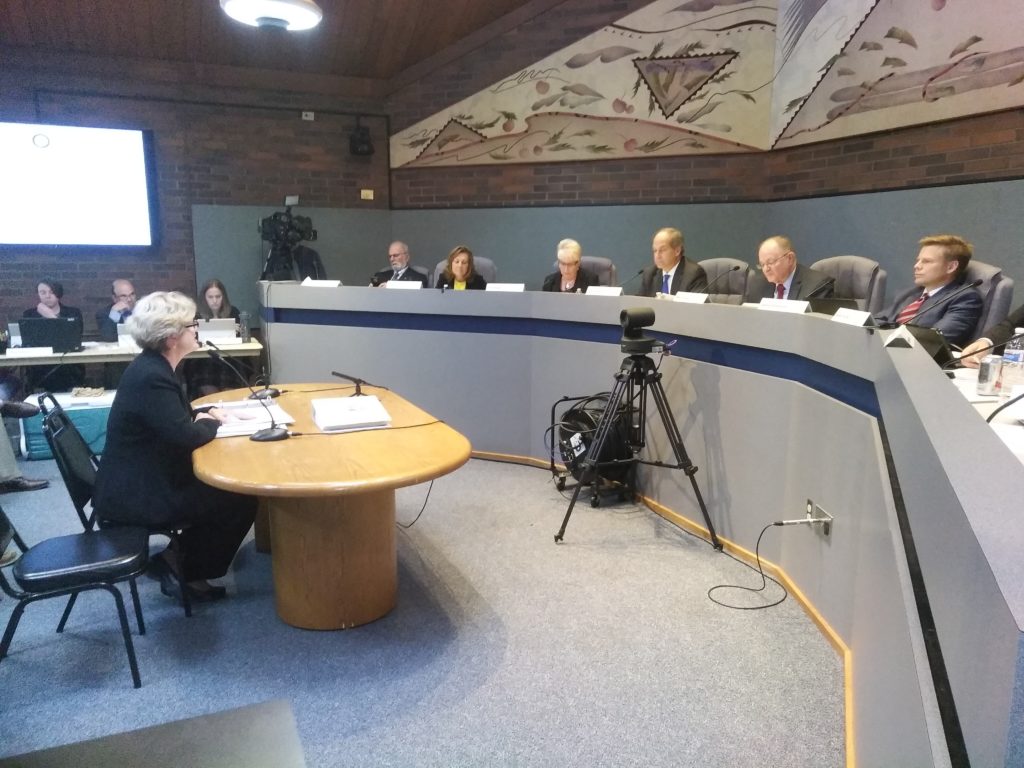
Sound Transit officials get a grilling at the Senate Law and Justice Committee’s first investigative hearing in Kent Sept. 26. Government and Community Relations Director Ann McNeil tells the committee that legislative permission for a $15 billion in new taxing authority allowed the agency to put forward a $54 billion ballot measure last year.
Dear friends and neighbors,
We’ve all heard stories about government agencies run amuck, but right now in the state Senate we’re looking into a case so big it boggles the mind. It involves billions and billions of dollars in taxpayer money, false promises to the Legislature and the concealment of a key fact from the voters that probably would have changed the outcome of an election. But here’s the worst part. Agency officials are telling us they did nothing wrong.
The Sound Transit debacle is a concern for the entire state. The biggest victims are the people of King, Pierce and Snohomish counties, who will be paying for a mammoth $54 billion bond issue over the next 25 years. Many already are feeling buyers’ remorse, as they face license-tab renewal fees that are hundreds of dollars higher than any of them imagined. Yet the affair ought to give all of us an uneasy feeling, in the Spokane Valley and in every other community that believes government agencies should maintain a high standard of conduct.
Last week the Senate Law and Justice Committee held the first of two investigative hearings into the Sound Transit affair. Already we have learned much that should concern us. We continue today with a second work session in Everett, as we probe whether the agency improperly used public resources to promote its bond issue. This is a matter of public trust, and we must ensure government respects the people and their elected representatives. This and more in this week’s newsletter.

Sen. Mike Padden
Good news from Spokane Airports
 Last week I was among a group of 11 legislators from Washington and Idaho who received a briefing from Spokane International Airports officials. Good news is on the horizon – traffic is booming; the number of flights is up 5 percent this year and passenger-seat sales have increased nearly 10 percent. Already a new non-stop route to Dallas is generating much additional traffic, and we can expect to see new routes added as growth continues. Improvements also are planned for Felts Field, Spokane’s civil aviation terminal. The Spokane airports are a vital element in our region’s hopes for economic development, and the traffic is an indication of our growing prosperity.
Last week I was among a group of 11 legislators from Washington and Idaho who received a briefing from Spokane International Airports officials. Good news is on the horizon – traffic is booming; the number of flights is up 5 percent this year and passenger-seat sales have increased nearly 10 percent. Already a new non-stop route to Dallas is generating much additional traffic, and we can expect to see new routes added as growth continues. Improvements also are planned for Felts Field, Spokane’s civil aviation terminal. The Spokane airports are a vital element in our region’s hopes for economic development, and the traffic is an indication of our growing prosperity.
Evergreen protests result in sanctions for 80 students
Earlier this year, the Senate Law and Justice Committee held a fact-finding work session on the protests that shut down The Evergreen State College for several days this spring. Now the college has announced that it will sanction 80 students with punishments that range from formal warnings, community service and probation. We will have to monitor the situation closely to determine how these sanctions are carried out. The situation already has imposed great costs on the state. School administrators, reluctant to enforce order when the protests occurred, have reached a $500,000 settlement with Professor Bret Weinstein, who faced harassment from students and fellow faculty members when he failed to accede to protesters’ demands.
Did Sound Transit mislead lawmakers and the public?
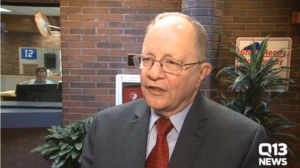
Seattle TV station KCPQ-13 outlined our Sound Transit investigation in this news story last week. To see story, click here.
At the end of our first hearing on Sound Transit last week, one thing was clear. When Sound Transit asked the Legislature for $15 billion in new taxing authority to continue construction of its light-rail system, no one had a clue what it really intended – except perhaps the agency itself. All through the Legislature’s debate, in testimony, talking points, letters to lawmakers, press releases and other communications, Sound Transit kept referring to the “full $15 billion” in taxing authority. We found many examples as we reviewed more than 7,000 pages of documents.
Instead, Sound Transit went to voters last year with a proposal that required $28 billion in new taxes – other funds brought it to $54 billion. So how did the amount balloon? When Sound Transit brought its bill to the Legislature, it didn’t cap the amount that could be collected. The bill merely specified tax sources and maximum tax rates. Sound Transit told the Legislature it contemplated collecting taxes for 16 years, and while there was much skepticism in the Senate, the Legislature ultimately accepted Sound Transit’s promises. Yet when the agency went to the ballot with its proposal, after the Legislature adjourned in 2016, it sought taxes that would last 25 years. Even the Democratic chair of the House Transportation Committee has acknowledged the Legislature would never have agreed to a bond issue that large. “Nobody was going to do that,” Rep. Judy Clibborn of Mercer Island told the The News Tribune in Tacoma. “Everybody was having that $15 billion in front of them.”
During our first hearing, we called on Sound Transit officials to explain. We noted that immediately after the 2015 session, Sound Transit stopped using the phrase “full $15 billion” in its official communications. We asked communications director Geoff Patrick to explain why. He told us, “After the Legislature granted the full authority, then I don’t think that became as relevant anymore.”
Did Sound Transit violate the state constitution?
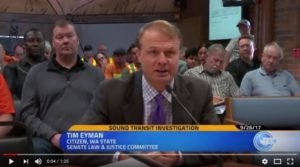
At last week’s hearing, longtime tax foe Tim Eyman explains how courts overturned his Initiative 747 in 2001 because the measure did not offer detail about its effect. Sound Transit’s bond issue had the same problem. To see testimony, click here.
What has Puget Sound motorists howling are sky-high car tabs. Everyone knew Sound Transit’s bond issue would be financed in part by renewal fees. But no one outside the agency understood it planned to use a valuation schedule junked by the Legislature years ago. That old schedule had nothing to do with market values – it inflated car and truck valuations for tax purposes. Voters had no clue.
This schedule was established by a murky reference in the bill to the long-repealed valuation schedule. The significance escaped the attention of the Legislature, the press and the general public. Sound Transit officials told us they saw no need to express their intentions forthrightly.
The state constitution says otherwise. Article II, section 37 says all legislation must spell out clearly what it will do. Courts have maintained this is a vital protection that prevents fraud and deception, and ensure full disclosure. The constitutional violation was clear, said Gonzaga University law professor emeritus David DeWolf. Even if the Legislature might have caught it, the public could not. DeWolf told us, “You shouldn’t require people to have a full set of statute books, much less a set of repealed statutes, to figure out what change this new law is going to bring about.”
Tim Eyman, promoter of numerous anti-tax ballot measures over the last two decades, told us his 2001 property-tax cap initiative, Initiative 747, was overturned on precisely those grounds, even though the effect of the measure was fully explained in the official state voters’ pamphlet. “The courts specifically said… what matters is the text of the measure,” he said. “And Sound Transit’s legislation hid from the public the valuation schedule by not setting it forth in full. If the scales of justice were balanced, Sound Transit’s deception would be found unconstitutional, too.”
In the news: Sound Transit investigation creates uproar
Our investigation has prompted a torrent of press coverage. Among the notable pieces is an editorial column in the Seattle Times observing that Sound Transit’s close relationship with a transportation-advocacy group, the Transportation Choices Coalition, has made it difficult to determine whether public resources are improperly being funneled to lobbying efforts. The column says, “The people footing the bill must know more about who is buying this influence over their government and their lives.”
Other stories include:
The (Tacoma) News Tribune: Did Sound Transit mislead lawmakers, or was it on the ‘up and up’ about ST3?
Seattle Times: How did Sound Transit’s $15 billion tax request reach $54 billion? Republicans say they were misled
The (Everett) Herald: State lawmakers pressing Sound Transit for serious answers
KING-TV: State starts probe into whether Sound Transit hid the true cost of ST3
KIRO-TV: State investigation could derail project to get light rail to Everett and Tacoma
KOMO-TV: Lawmakers investigating Sound Transit over ST3
KIRO-FM: Legal expert: Sound Transit 3 procedure violated constitution
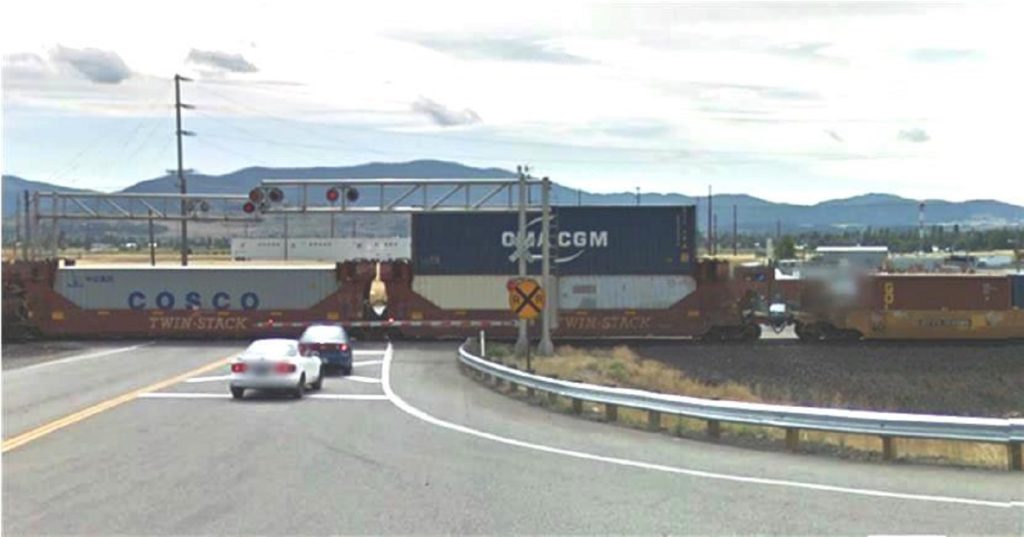
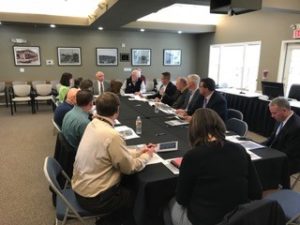 The planned Barker Road grade separation and other Spokane Valley transportation projects were the subject of a briefing and tour Wednesday. It was my pleasure to join with Rep. Matt Shea, R-Spokane Valley, as we heard from city, law enforcement and fire officials from Spokane Valley and Liberty Lake, and from DOT Secretary Roger Millar.
The planned Barker Road grade separation and other Spokane Valley transportation projects were the subject of a briefing and tour Wednesday. It was my pleasure to join with Rep. Matt Shea, R-Spokane Valley, as we heard from city, law enforcement and fire officials from Spokane Valley and Liberty Lake, and from DOT Secretary Roger Millar.
Contact us
If you have a question or concern about state government, please do not hesitate to contact our office. We are here to serve you!
Phone: (509) 921-2460
Street address: 11707 East Sprague Ave., Suite 305, Spokane Valley, WA 99206
Email address: Mike.Padden@leg.wa.gov
 Last week I was among a group of 11 legislators from Washington and Idaho who received a briefing from Spokane International Airports officials. Good news is on the horizon – traffic is booming; the number of flights is up 5 percent this year and passenger-seat sales have increased nearly 10 percent. Already a new non-stop route to Dallas is generating much additional traffic, and we can expect to see new routes added as growth continues. Improvements also are planned for Felts Field, Spokane’s civil aviation terminal. The Spokane airports are a vital element in our region’s hopes for economic development, and the traffic is an indication of our growing prosperity.
Last week I was among a group of 11 legislators from Washington and Idaho who received a briefing from Spokane International Airports officials. Good news is on the horizon – traffic is booming; the number of flights is up 5 percent this year and passenger-seat sales have increased nearly 10 percent. Already a new non-stop route to Dallas is generating much additional traffic, and we can expect to see new routes added as growth continues. Improvements also are planned for Felts Field, Spokane’s civil aviation terminal. The Spokane airports are a vital element in our region’s hopes for economic development, and the traffic is an indication of our growing prosperity.















